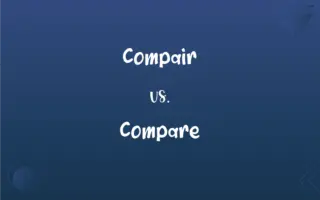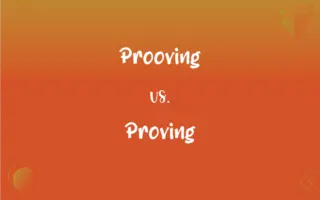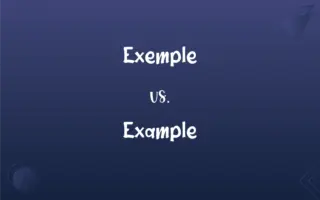Bringed vs. Brought: Mastering the Correct Spelling
Edited by Aimie Carlson || By Janet White || Published on March 19, 2024
Bringed is incorrect; the correct past tense of bring is brought, referring to the action of having carried or moved to a place.

Which is correct: Bringed or Brought
How to spell Brought?

Bringed is Incorrect

Brought is Correct
ADVERTISEMENT
Key Differences
Visualize bringing something to a 'u' turn – you've 'brought' it.
Recall 'brought' has a 'u,' like 'you' who has brought something.
Remember, 'brought' has the same 'ough' pattern as 'thought' and 'fought.'
Think of 'brought' as a combination of 'brow' (as in forehead) and 'ought' – it should look and sound right.
'Bringed' sounds awkward; 'brought' is smooth and follows common past tense forms like 'caught' or 'sought.'
ADVERTISEMENT
Correct usage of Brought
The teacher bringed in a guest speaker for the lecture.
The teacher brought in a guest speaker for the lecture.
She bringed her friends to the party last night.
She brought her friends to the party last night.
I bringed my lunch to work to save money.
I brought my lunch to work to save money.
They bringed up an interesting point during the meeting.
They brought up an interesting point during the meeting.
He has bringed his expertise to many projects over the years.
He has brought his expertise to many projects over the years.
Brought Definitions
To have caused a condition or situation to exist.
His leadership brought prosperity to the town.
To have caused or resulted in something.
The new policy brought significant changes.
To have introduced a topic or idea in conversation or discussion.
The issue was brought up during the meeting.
The past tense of bring, meaning to have carried or moved something to a place.
She brought her friend to the party.
To have made an item or person come to a particular place or event.
He brought his expertise to the project.
Past tense and past participle of bring.
Simple past tense and past participle of bring
Brought Sentences
He brought his concerns to the manager.
They brought snacks for the road trip.
She brought her dog to the pet-friendly café.
He brought his friend to the concert.
He brought his camera to capture the sunset.
She brought a blanket to the beach.
He brought his paintings to the art show.
The scientist brought new evidence to light.
She brought a new perspective to the team.
He brought his report card home proudly.
They brought their homework to the tutor for help.
The children brought their toys to share.
She brought her questions to the discussion.
She brought a pie to the dinner party.
He brought his laptop to work from the café.
He brought his ideas to the brainstorming session.
They brought their A-game to the competition.
They brought their own bags to the grocery store.
She brought her love for music to the choir.
She brought a gift to the host.
She brought her enthusiasm to every project.
The volunteers brought hope to the community.
They brought their concerns about the environment to the forum.
He brought his knowledge of history to the debate.
She brought her recipes to the cooking class.
FAQs
Why is it called brought?
It's called brought because it's the past tense of 'bring,' indicating the action of moving or carrying something to a place.
What is the pronunciation of brought?
Brought is pronounced as /brɔːt/.
What is the plural form of brought?
Brought serves as both the singular and plural form.
What is the root word of brought?
The root word is 'bring.'
Which conjunction is used with brought?
'And' is commonly used, as in 'brought and presented.'
Is brought a noun or adjective?
Brought is a verb (past tense of bring).
What is the verb form of brought?
The base verb form is 'bring;' 'brought' is the past tense and past participle.
Which vowel is used before brought?
Typically, the article 'a' is used before brought, as in 'a brought item.'
Which article is used with brought?
Typically, 'the' or 'a,' depending on context, as in 'the items he brought' or 'a solution brought forward.'
Which preposition is used with brought?
'To' is commonly used with brought, as in 'brought to the party.'
Is brought an adverb?
No, brought is not an adverb.
What is a stressed syllable in brought?
The entire word 'brought' is stressed as it is only one syllable.
How is brought used in a sentence?
Example: "He brought his knowledge and experience to the challenging project."
What is the singular form of brought?
Brought is both the singular and plural form as a verb; it doesn’t change.
Is brought a vowel or consonant?
The word 'brought' starts with the consonant 'b.'
How many syllables are in brought?
There is one syllable in 'brought.'
Is brought a countable noun?
Brought is not a noun; it's a verb and thus not countable.
Is the word brought imperative?
No, 'brought' is not imperative; it's the past tense of 'bring.'
Which determiner is used with brought?
Determiners like 'the,' 'a,' or 'this' can be used depending on context.
What is the third form of brought?
The third form is also 'brought.'
Is brought an abstract noun?
No, brought is a verb, not a noun.
Is brought a negative or positive word?
Brought is neutral; it can be positive or negative based on context.
What part of speech is brought?
Brought is a verb (past tense of bring).
What is the second form of brought?
The second form is 'brought' itself.
Is brought a collective noun?
No, brought is a verb, not a noun.
Is the brought term a metaphor?
Not typically, but it can be used metaphorically in some contexts.
What is the opposite of brought?
The opposite of brought could be 'took' or 'removed.'
What is the first form of brought?
The first form is 'bring.'
How do we divide brought into syllables?
Brought is a single syllable and not divided.
What is another term for brought?
Another term for brought could be 'conveyed' or 'transported.'
About Author
Written by
Janet WhiteJanet White has been an esteemed writer and blogger for Difference Wiki. Holding a Master's degree in Science and Medical Journalism from the prestigious Boston University, she has consistently demonstrated her expertise and passion for her field. When she's not immersed in her work, Janet relishes her time exercising, delving into a good book, and cherishing moments with friends and family.
Edited by
Aimie CarlsonAimie Carlson, holding a master's degree in English literature, is a fervent English language enthusiast. She lends her writing talents to Difference Wiki, a prominent website that specializes in comparisons, offering readers insightful analyses that both captivate and inform.


































































